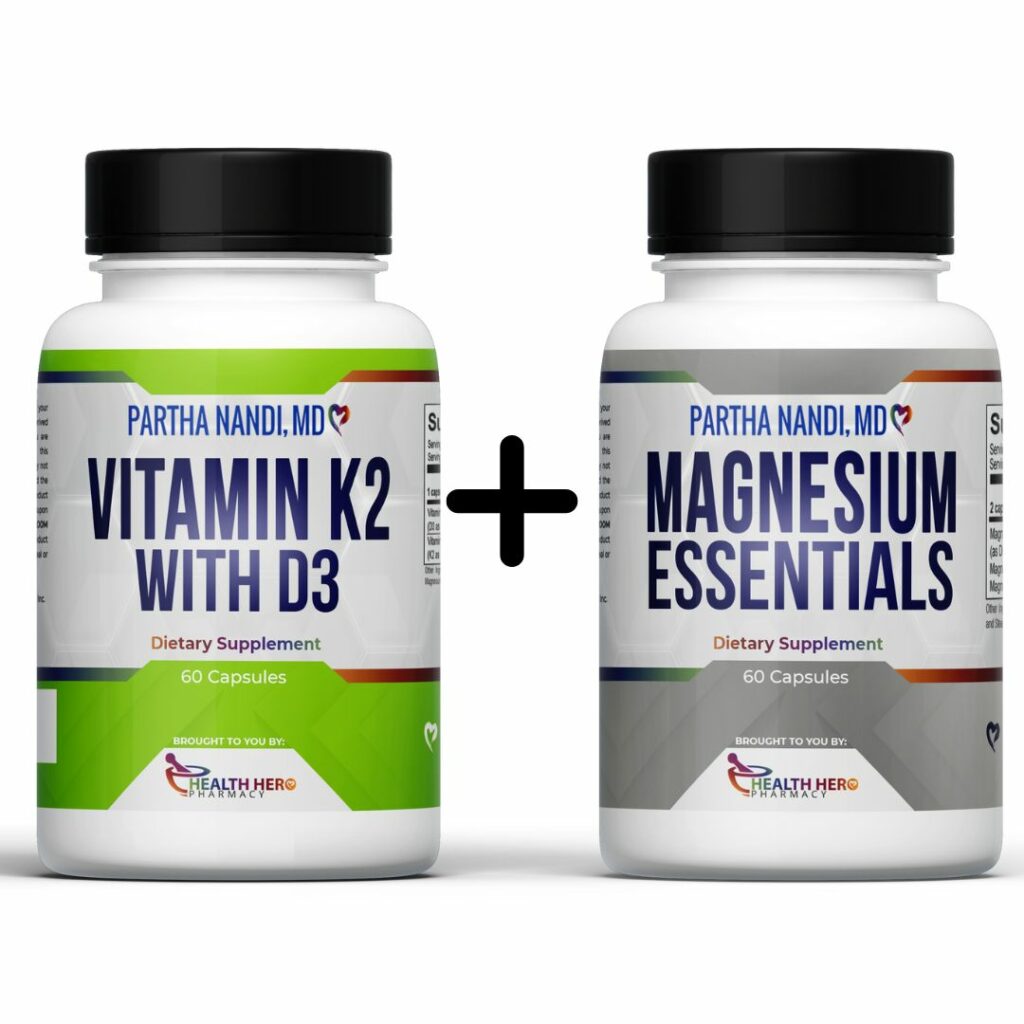In a revelation that may take many by surprise, the American Heart Association has highlighted a concerning health reality: over 40% of adults are walking around with clogged arteries, largely unaware of the ticking time bomb within them. This condition, known medically as atherosclerosis, is a silent precursor to some of the most severe heart-related ailments, including strokes and heart attacks. The culprits behind this alarming situation are not strangers to us; they stem from the very lifestyle and dietary choices that define modern living.1
As a doctor passionate about promoting a healthy lifestyle and inspiring stories of wellness, I find it crucial to shed light on this issue. It’s not just about identifying the problem but also about offering a beacon of hope and practical solutions. In this spirit, we delve into the heart of the matter, exploring how simple, natural remedies, specifically three miraculous fruits, can play a pivotal role in cleansing our arteries and safeguarding our heart health.
Join me on this enlightening journey, as we uncover not just the hidden dangers lurking in our arteries but also the simple, joyful ways we can combat them. Let’s embrace a path that leads us to a heartier, more vibrant life, one where health is not just a goal but a joyful journey.
Unveiling the Silent Threat: Atherosclerosis
Atherosclerosis, a term that might not be a staple in everyday conversation, carries a significance that can’t be overstressed in the realm of heart health. This condition, commonly referred to as arterial clogging, occurs when plaque, a mixture of fats, cholesterol, and other substances, builds up on the walls of arteries. This buildup leads to the arteries becoming narrower and harder, a dangerous transformation that can significantly hinder blood flow. The repercussions of such a condition are far-reaching, as it lays the groundwork for more serious heart-related issues, including the risk of strokes and heart attacks2.
The modern lifestyle has unfortunately become a breeding ground for the risk factors associated with atherosclerosis. High intake of saturated and trans fats, smoking, lack of physical activity, elevated blood pressure, and increased cholesterol levels are all contributing to the uptick in cases of arterial clogging. The stark reality is that this condition is becoming more common, underscoring an urgent need for awareness and proactive measures to combat its spread.
The implications of atherosclerosis extend beyond the physical, affecting individuals’ quality of life and, in severe cases, leading to life-threatening conditions. Recognizing the causes and the silent progression of this condition is the first step in addressing what has become a global health concern. With a clear understanding of its underpinnings, we can better navigate the path towards prevention and healthier living. This awareness is essential, as the battle against atherosclerosis is not just about prolonging life but enhancing the quality of life itself.

Identifying the Warnings: The Subtle Signs of Arterial Clogs
Arterial clogs often progress quietly, making early detection a critical element in preventing severe health consequences. While some individuals may not experience noticeable symptoms, others might encounter distinct warning signs that should not be ignored. Recognizing these symptoms is pivotal for timely intervention and can drastically alter the course of one’s health trajectory.
- Chest Discomfort or Pain (Angina): This discomfort or pain is not limited to the chest; it can also radiate to the arms, neck, jaw, or back. It’s often the first sign of restricted blood flow to the heart, signaling that the heart is working harder than usual to pump blood through narrowed arteries.
- Breathlessness: Experiencing shortness of breath can indicate that the heart is not receiving enough oxygen due to reduced blood flow, a direct consequence of arterial blockage.
- Fatigue: A less specific but concerning symptom, fatigue can emerge when the heart is unable to pump blood efficiently, leading to decreased oxygen and nutrient delivery to tissues and organs.
- Dizziness: Restricted blood flow can also affect the brain, leading to episodes of dizziness or lightheadedness, underscoring the systemic impact of arterial clogs.
These symptoms are the body’s way of signaling that something is amiss. Ignoring these signs or delaying medical consultation can lead to progressively worsening conditions, potentially culminating in heart attacks or strokes. The key to prevention lies in heedfulness and action. By staying vigilant and responsive to our body’s signals, we can take significant strides in safeguarding our heart health.
The Power of Nature: Fruits for Heart Health
In the quest for a heart-healthy lifestyle, nature offers some of the best remedies in the form of fruits. Rich in antioxidants, vitamins, and minerals, certain fruits have been recognized for their ability to combat arterial clogs and bolster cardiovascular health. Integrating these natural powerhouses into your diet can provide a delicious and effortless way to support your heart.
- Pomegranates: This ancient fruit, admired for its vibrant ruby-red seeds, is a powerhouse of antioxidants, particularly polyphenols. These compounds help in reducing oxidative stress and inflammation, two culprits behind arterial clogging. Studies suggest that pomegranate juice can enhance blood vessel function, elevate “good” HDL cholesterol, and decrease plaque buildup in the arteries.
- Raspberries: Not only are they delightfully tangy and sweet, but raspberries also boast a high fiber content, essential for lowering cholesterol levels. They’re loaded with antioxidants like quercetin and ellagic acid, which have been linked to cardiovascular benefits. Regular consumption of raspberries can help reduce blood pressure and cut the risk of heart disease.
- Grapefruit: This citrus gem is a source of vitamin C, fiber, and antioxidants. Flavonoids found in grapefruit are especially beneficial for heart health, aiding in the improvement of blood vessel function and the reduction of atherosclerosis risk. Additionally, grapefruit can have a positive effect on your lipid profile by lowering total cholesterol, LDL cholesterol (the “bad” cholesterol), and triglycerides.
Incorporating these fruits into your diet doesn’t have to be mundane. From sprinkling pomegranate seeds over your morning yogurt to blending raspberries into your smoothies, or enjoying a fresh grapefruit as a midday snack, there are countless ways to enjoy these heart-healthy delights. Embracing fruits for heart health is not just about adding to your diet; it’s about making enjoyable changes that benefit your overall well-being.

Beyond the Fruit Bowl: Diversifying Heart-Healthy Choices
While fruits like pomegranates, raspberries, and grapefruits are stellar for heart health, a balanced approach incorporating a variety of nutrient-rich foods can amplify the benefits. Embracing a diverse diet can help further reduce the risk of arterial clogs and enhance overall cardiovascular wellness. Here are additional foods to consider including in your heart-healthy regimen:
- Olive Oil: Celebrated for its heart-healthy monounsaturated fats, olive oil can lower bad LDL cholesterol levels while providing a dose of antioxidants. Incorporating olive oil into your diet, in place of less healthy fats, can contribute significantly to heart health.
- Whole Grains: Foods like oats, whole wheat, and brown rice are high in dietary fiber, which can help reduce cholesterol and provide a sustained energy source. They’re also packed with vitamins and minerals, supporting overall health.
- Fatty Fish: Salmon, mackerel, and other fatty fish are rich in omega-3 fatty acids, known for their heart-protective properties. Regular consumption of these fish can help reduce inflammation and lower the risk of heart disease.
- Nuts: Almonds, walnuts, and other nuts are not only great snack options but also beneficial for your heart. They contain monounsaturated fats, protein, and fiber, all of which contribute to lowering LDL cholesterol and improving heart health.
Incorporating these foods into your daily meals can be both simple and enjoyable. Drizzling olive oil on salads, choosing whole grain bread for your sandwiches, including fatty fish in your weekly meal plans, and snacking on a handful of nuts are just a few ways to diversify your intake of heart-healthy nutrients. Remember, a varied diet rich in natural foods is key to supporting a strong and healthy heart.
Embracing a Holistic Approach to Heart Health
While integrating heart-healthy fruits into your diet is a step in the right direction, it is crucial to recognize that heart health extends beyond just what we eat. A holistic approach, encompassing a balanced diet, regular physical activity, effective stress management, and avoiding harmful habits like tobacco use, forms the cornerstone of cardiovascular wellness. This comprehensive strategy ensures that all aspects of heart health are addressed, creating a robust foundation for a healthy heart and a vibrant life.3
Physical activity is paramount, with guidelines recommending at least 30 minutes of moderate-intensity exercise most days of the week. Exercise not only helps control weight and reduce blood pressure but also plays a significant role in strengthening the heart and improving blood circulation. Alongside physical health, emotional well-being cannot be overlooked. Stress, a common ailment in today’s fast-paced world, has been linked to heart disease. Implementing stress-reduction techniques such as meditation, yoga, or even simple deep-breathing exercises can have profound effects on both mental and heart health.
Lastly, the decision to quit smoking cannot be understated in its importance for heart health. Smoking is a major risk factor for atherosclerosis and other heart conditions. The journey to quit smoking is challenging yet immensely rewarding, with immediate and long-term benefits for heart health. By adopting this holistic approach, individuals can not only improve their heart health but also enhance their overall quality of life, proving that a healthy heart is a key to a fulfilling existence.
My Personal RX on Embracing Heart Health
As a doctor, I’ve seen firsthand the impact of lifestyle choices on heart health. The journey towards a healthier heart is not just about avoiding the bad; it’s about embracing practices that enhance your overall well-being. Here are my personal recommendations to keep your heart beating strong and resilient:
- Incorporate Heart-Healthy Superfoods: Focus on a diet rich in fruits, vegetables, whole grains, and lean proteins. These foods provide essential nutrients for heart health and overall vitality.
- Stay Active: Aim for at least 30 minutes of moderate exercise daily. Whether it’s a brisk walk, cycling, or yoga, find an activity you enjoy and make it part of your routine.
- Manage Stress: Adopt stress-reduction techniques such as deep breathing, meditation, or spending time in nature. A calm mind contributes to a healthy heart.
- Monitor Your Health: Regular check-ups with your healthcare provider can help detect and manage risk factors like high blood pressure or cholesterol early on.
- Opt for the Magnesium + Vitamin K2 D Bundle: This powerful combination supports optimal calcium absorption and boosts immune health, playing a crucial role in maintaining a balanced and heart-healthy lifestyle.
- Seek Inspiration: The “Health Hero Movie” guide offers uplifting stories of real people overcoming health challenges. Let these stories inspire you to make positive health choices.
- Limit Processed Foods: Reduce intake of foods high in saturated fats, trans fats, and sugars. These can contribute to heart disease and other health issues.
- Stay Hydrated: Drinking plenty of water is essential for overall health and helps your heart pump blood more easily.
- Quit Smoking: If you smoke, quitting is one of the best things you can do for your heart. It’s never too late to benefit from stopping.
- Prioritize Sleep: Ensure you get 7-9 hours of quality sleep each night. Adequate sleep is crucial for heart health and helps reduce stress and inflammation.
By integrating these tips into your daily life, you’re not just improving your heart health; you’re setting the stage for a happier, more vibrant life. Remember, small changes can lead to big impacts over time.

Sources:
- American Heart Association | To be a relentless force for a world of longer, healthier lives. (n.d.). www.heart.org. https://www.heart.org/ ↩︎
- Arteriosclerosis / atherosclerosis – Symptoms and causes – Mayo Clinic. (2022, July 1). Mayo Clinic. https://www.mayoclinic.org/diseases-conditions/arteriosclerosis-atherosclerosis/symptoms-causes/syc-20350569 ↩︎
- Meyer, A. (2023, March 1). The 5 best fruits to help improve your heart health. EatingWell. https://www.eatingwell.com/article/8032022/best-fruits-for-heart-health/ ↩︎




















